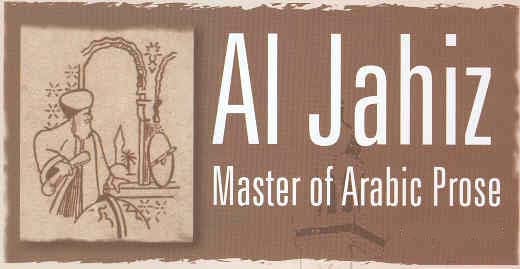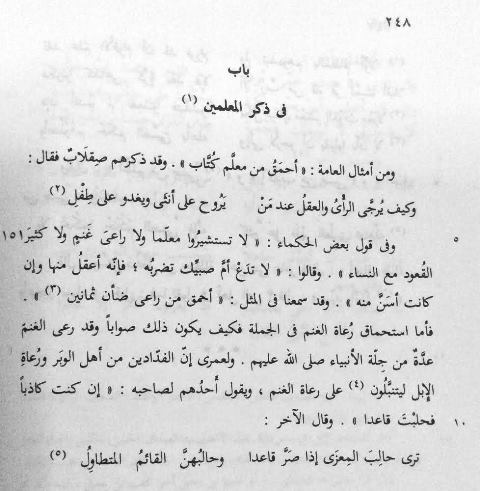Photo credit www.alshindagah.com
This week, I am required to read Sebastian Günther’s article: “Be masters in that you teach and continue to learn: Medieval Muslim thinkers on educational theory.” Comparative Education Review 50, no. 3 (2006): 367-388. The reading will emphasize specifically on al-Jahiz’s view on education. Other colleagues read ideas of Ibn Sahnun, al-Farabi, Ibn Sina, al-Ghazali and some other ‘medieval’ Muslim educationists.
Here is the report on my reading:
Assalamualaikum wa Rahmatullah wa Barakatuh.
Brothers and sisters,
I chose to read and share with you about Abū ʿUthman ʿAmr ibn Baḥr al-Kinānī al-Baṣr, known as al-Jahiz, ‘the goggle eyed’. He was born in Basrah in year 159AH / 776AC.
A very prolific bibliomania, wrote so many books in so many subjects, never came across my mind about him talking about education. Thank you ITEP for instructing me to read Sebastian Günther’s article, “Be masters in that you teach and continue to learn: Medieval Muslim thinkers on educational theory.” Comparative Education Review 50, no. 3 (2006): 367-388. The article is ‘short but sweet’, interesting enough to let me read the whole thing and left me in amuse.
I bought my copy of al-Bayān wa al-Tabyīn, one of al-Jahiz’s most important books, so many years ago, without realizing him, dedicated a specific chapter about teachers and education, Bāb fī Dzikr al-Mu’allimīn, in volume 1 of the 4 volumes books.
DEFENDING SCHOOL TEACHER
Al-Jahiz reminds me of what the Finnish Government did to transform the national education, and that is by uplifting the perception towards school teachers. Finnish government according to Pasi Sahlberg in ‘Finnish Lessons’ said, “… In the Finnish context, teaching is a high-status profession, akin to being a doctor. Those who enter not only stay in teaching, but many continue their studies, not to leave, but to learn more and contribute more to their profession. This heightened sense of professionalism makes teaching a sough-after position and one obtained only by those who are fortunate enough to be chosen for candidacy…”
Al-Jahiz championed school teachers and repeatedly stressed their superiority over all other kind of educators and tutors, including private tutors for royal prince and princess. I shared this point repeatedly with teachers in our school, that they must see themselves doing noble tasks. This might be an irrelevant matter in some society, but in a country like Malaysia, being a teacher is not considered as a high status profession as it used to be 50 years ago. So, we try our best to pay our teachers decently , helping each of the teachers to do some self assessment to identify their uniqueness, and confidently ‘market’ themselves as professional in social media like Linkedin and now we are planning to train our teachers to become book writers, that will insha-Allah in the near future help them to expand their career, their social status, as well as the financial too.
I really appreciate what al-Jahiz described about this, which I didn’t know before.
IN WHAT SENSE EDUCATION GIVES HUGE IMPACT TO HUMAN CIVILIZATION?
Al-Jahiz emphasized on the importance of speaking, writing, and calculation as the pillars of civilization. The importance of speaking and writing reminds us to Prof Naquib al-Attas who always highlight the ‘meaning’ which is the ‘recognition of the place of anything in a system’. We think with words that contain meaning. If one has limited vocabularies, the person will also have limited thinking, which reduces his capacity as hayawān nātiq (the rational being). The word nātiq and nutq, are derived from the same root word which convey the basic meaning of ‘speech’. A man with proper education can speak and write his mind as it should be.
In our country, language and literature are considered to be one of the most debatable issue in education. Considering English as our second language and being part of the Commonwealth country, many elder generation believe that English is the only language that can express knowledge, science and ideas. The national language, Malay language is significantly threatened, being marginalized by the working sector which currently demands good proficiency in English. I believe, one of the reasons why Malay language is perceived negatively by the upper class, urban, and English educated members of the society is because reading classical text in Malay language is no longer required in our education. We read simple materials, and lost thousands of Malay terminologies despite the language was understood from Persia to Hawaii in the 17th century.
Now, we have students who are not 100% English, neither 100% Malay, they have limited words and could not accurately describe what they think and feel, because of the negligence in this matter.
The importance of engaging students with classical text, knowing how scholars conveyed their ideas, is undeniably needed, not just within Arabic language as some might understood when reading about al-Jahiz’s idea, but all other native languages.
We don’t judge people by religion, race, gender or age, but we really can judge people by the way they speak and write. Al-Jahiz strongly emphasized this as his main idea in education.
So, in our school, we offer Malay 1, 2, 3, 4, English 1,2,3,4 and Arab 1,2,3,4 as compulsory subjects for all students, and we offer Malay 5,6, English 5,6, and Arab 5, 6, as elective subjects to promote students reading classical texts and learning different forms of language usage.
We have classes only on Mondays to Thursdays. In Friday, we have the weekly assembly with dedicated sessions for students to exercise their capability in public speaking, debate and orator. This is the least we can do to make sure our students develop their interests in the section al-Jahiz mentioned in his book. What is man without the sense of ‘meaning’?
BETWEEN MEMORIZATION AND DEDUCTIVE REASONING
Al-Jahiz was better known as an important scholar in the school of Mu’tazilah as opposed of Ibn Qutaybah from the Sunni side. As we all know, the Mu’tazilah is noted for placing reasoning and dialectics at the centre of its doctrine. Even though Mu’tazilah had gone to the extreme level of speculative theology, the importance of maintaining the capability of men in their logical process, is critical in education. This was crystallized by al-Jahiz in his opinion. The main reason why he criticized the memorization form of learning, is because he believed that memorization makes the student blunt minded, disregard distinction. But he did not reject the importance of memorization because it will help the understanding to remain long in hearts. What important is, to balance between the two, and to maintain the similar motives of both methods and they are (i) to free the mind (ii) to make the student desired to learning.
There is a good study done by Helen N. Boyle, titled “Memorization and Learning in Islamic Schools” which I would recommend brothers and sisters to benefit from it.
SUB DIVISIONS OF EDUCATIONAL PSYCHOLOGY
Al-Jahiz listed the main subjects students should learn and they are all aligned with the suggestion given by Gutek which we covered during week 2 in this program. The subjects are as follow:
- Metaphysics – Quran
- Epistemology – Quran
- Axiology – Law, the pillars of religion
- Ethics – orator to argue ideas
- Aesthetics – prosody, poetry
- Logic – grammar, arithmetic
I believe that al-Jahiz also gave specific attention to individual empowerment by enhancing their capability to express their thought and feeling without being assisted by any additional interpretation and comment. This is vital to develop the idea of independent mind as he described in many parts of the literature.
I am also interested in the emphasization al-Jahiz imposed on physical activities and skills like polo, archery, horsemanship, music, chess and other games. Is there any contemporary scholars endorse music and chess for Islamic Schools? What do you think of these two subjects?
In our school, self defense is highly recommended to all students, boys and girls. Previously they have tae-kwon-do but now we change to Aikido. The late founder of our school reminded us to ensure that our students are physically good and we believe this is also a critical part of the education, which also require the school to serve healthy food for our students. But again, we are struggling financially to achieve that.
PEDAGOGY
Al-Jahiz, the observant of human nature (as demonstrated in his Book of Life / Kitāb al-Hayawān), believed that a teacher must acknowledge the students’ condition, teach using the language and level that the students understand, emphasized on treating students gently and kindness, but firm.
I believe this is not simply a matter of choosing what is preferred but treating students with kindness and gentle is both scientific and sunnah. Psychology proves that students can only learn effectively in a motivating and positive environment. And at the same time, if we look at the practice of our Prophet PBUH, Mālik bin al-Huwayrith r.a. told us the story of him and his colleagues staying for 20 nights with the Prophet PBUH to learn. But then he found that all the ‘students’ lost their concentration. He asked them what bother them and he paid full attention to their story. Rasulullah PBUH then instructed them to go home and be with the family. He did not humiliate them by accusing them for being soft hearted. He told them to practise at home what he taught them and asked the eldest to lead the prayer. They left the Prophet physcially, but they took him home with them, ‘intellectually, emotionally and spiritually’! That’s how effective the Prophetic approach, compared to the aggressiveness we do, in the name of Tarbiyyah! May Allah forgive us.
This is surprisingly aligned with our current practice and if it is not because of his Mu’tazilah background, I would probably dedicate his name to our Main Hall at school as The al-Jahiz Hall!!!
CONCLUSION
Al-Jahiz, along with all the medieval educationists Günther listed in his article, demonstrated how advance the idea of education our scholars had. Perhaps, the ‘term’ medieval should be replaced with ‘the Golden Age’ since the nuance is Euro Centric and the opposite of where the Muslim world stood at that time.
And, for not commonly known as educationists like al-Qasibi and al-Zarnuji, these scholars’ opinion on education is a form of metacognitive assessment, telling as that without a proper education, there will be no Ibn Sahnun, no al-Jahiz, no, al-Farabi, no Ibn SIna, and no al-Ghazali ever exist in history. And to acknowledge the ‘medieval’ ideas of Muslim educationists does not mean that we want to adopt the idea per se, but more or less to enhance our self confidence in standing on own own Islamic Tradition, as discussed by Prof Seyyed Hossein Nasr in the interview.
Wallahu A’lam.
Hasrizal.

